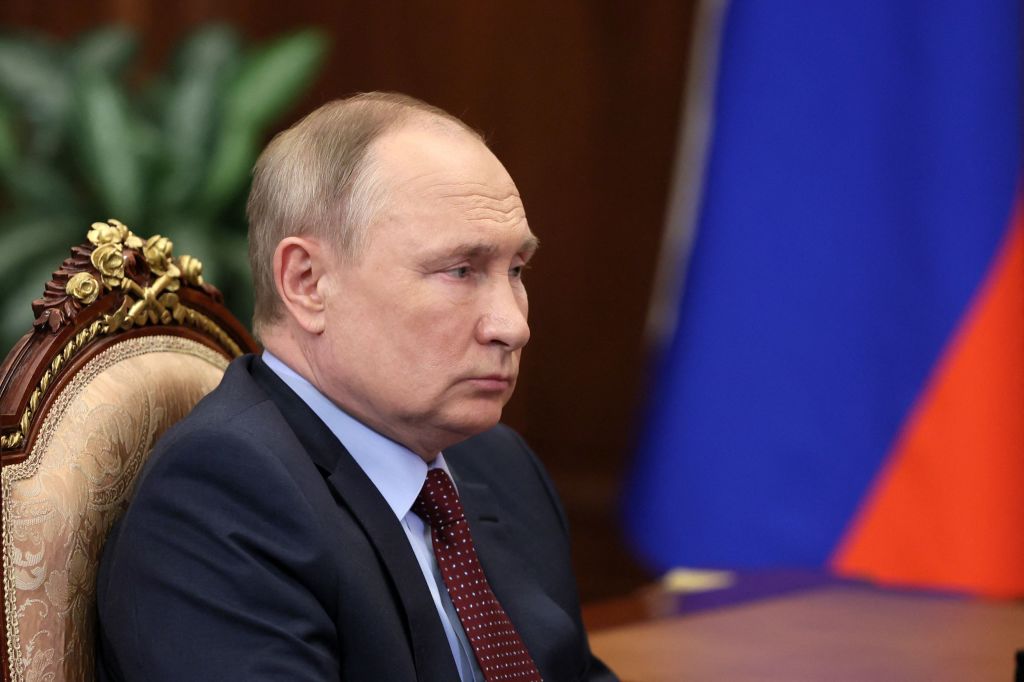Putin threatens Ukraine with loss of statehood


A free daily email with the biggest news stories of the day – and the best features from TheWeek.com
You are now subscribed
Your newsletter sign-up was successful
Russian President Vladimir Putin said Saturday that if Ukraine could lose its statehood if it continues to resist Russia's invasion, The New York Times reports.
"The current leadership needs to understand that if they continue doing what they are doing, they risk the future of Ukrainian statehood," Putin said in Moscow on Saturday. "If that happens," he continued, "they will have to be blamed for that."
The precise goal of Putin's invasion remains unclear, but few experts believe he wants to fully annex Ukraine. Taking part of a country — as he did with Crimea in 2014 — is one thing. Wiping an entire nation off the map would be something else entirely.
The Week
Escape your echo chamber. Get the facts behind the news, plus analysis from multiple perspectives.

Sign up for The Week's Free Newsletters
From our morning news briefing to a weekly Good News Newsletter, get the best of The Week delivered directly to your inbox.
From our morning news briefing to a weekly Good News Newsletter, get the best of The Week delivered directly to your inbox.
Likelier outcomes would involve setting up a Russia-friendly puppet government in Kyiv or incorporating large parts of eastern Ukraine into Russia while leaving a pro-Western rump in the west. Bold as annexing Ukraine might be, however, Putin has presented historical arguments he argues would justify exactly that, referring to modern Ukraine as a creation of the Soviet Union.
Since the end of World War Two, the total annexation of one sovereign state by another has been exceedingly rare. Attempts that were subsequently reversed include Iraq's 1990 annexation of Kuwait, Indonesia's 1975 annexation of East Timor, and Ethiopia's 1962 annexation of Eritrea.
The People's Republic of China annexed Tibet in 1951, though whether Tibet was a sovereign nation prior to the annexation is debated. The reunification of Vietnam in 1975 was effectively an annexation of South Vietnam by the communist north.
A free daily email with the biggest news stories of the day – and the best features from TheWeek.com
Grayson Quay was the weekend editor at TheWeek.com. His writing has also been published in National Review, the Pittsburgh Post-Gazette, Modern Age, The American Conservative, The Spectator World, and other outlets. Grayson earned his M.A. from Georgetown University in 2019.
-
 The ‘ravenous’ demand for Cornish minerals
The ‘ravenous’ demand for Cornish mineralsUnder the Radar Growing need for critical minerals to power tech has intensified ‘appetite’ for lithium, which could be a ‘huge boon’ for local economy
-
 Why are election experts taking Trump’s midterm threats seriously?
Why are election experts taking Trump’s midterm threats seriously?IN THE SPOTLIGHT As the president muses about polling place deployments and a centralized electoral system aimed at one-party control, lawmakers are taking this administration at its word
-
 ‘Restaurateurs have become millionaires’
‘Restaurateurs have become millionaires’Instant Opinion Opinion, comment and editorials of the day
-
 What is ‘Arctic Sentry’ and will it deter Russia and China?
What is ‘Arctic Sentry’ and will it deter Russia and China?Today’s Big Question Nato considers joint operation and intelligence sharing in Arctic region, in face of Trump’s threats to seize Greenland for ‘protection’
-
 What would a UK deployment to Ukraine look like?
What would a UK deployment to Ukraine look like?Today's Big Question Security agreement commits British and French forces in event of ceasefire
-
 Would Europe defend Greenland from US aggression?
Would Europe defend Greenland from US aggression?Today’s Big Question ‘Mildness’ of EU pushback against Trump provocation ‘illustrates the bind Europe finds itself in’
-
 Did Trump just end the US-Europe alliance?
Did Trump just end the US-Europe alliance?Today's Big Question New US national security policy drops ‘grenade’ on Europe and should serve as ‘the mother of all wake-up calls’
-
 Is conscription the answer to Europe’s security woes?
Is conscription the answer to Europe’s security woes?Today's Big Question How best to boost troop numbers to deal with Russian threat is ‘prompting fierce and soul-searching debates’
-
 Trump peace deal: an offer Zelenskyy can’t refuse?
Trump peace deal: an offer Zelenskyy can’t refuse?Today’s Big Question ‘Unpalatable’ US plan may strengthen embattled Ukrainian president at home
-
 Vladimir Putin’s ‘nuclear tsunami’ missile
Vladimir Putin’s ‘nuclear tsunami’ missileThe Explainer Russian president has boasted that there is no way to intercept the new weapon
-
 The Baltic ‘bog belt’ plan to protect Europe from Russia
The Baltic ‘bog belt’ plan to protect Europe from RussiaUnder the Radar Reviving lost wetland on Nato’s eastern flank would fuse ‘two European priorities that increasingly compete for attention and funding: defence and climate’
